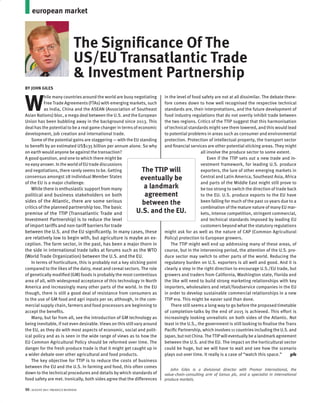
US EU TTIP August 2015
- 1. european market John Giles is a divisional director with Promar International, the value-chain-consulting arm of Genus plc, and a specialist in international produce markets. in the level of food safety are not at all dissimilar. The debate there- fore comes down to how well recognised the respective technical standards are, their interpretations, and the future development of food industry regulations that do not overtly inhibit trade between the two regions. Critics of the TTIP suggest that this harmonisation of technical standards might see them lowered, and this would lead to potential problems in areas such as consumer and environmental protection. Protection of intellectual property, the transport sector and financial services are other potential sticking areas. They might all involve the produce sector to some extent. Even if the TTIP sets out a new trade and in- vestment framework, for leading U.S. produce exporters, the lure of other emerging markets in Central and Latin America, Southeast Asia, Africa and parts of the Middle East might still prove to be too strong to switch the direction of trade back to the EU. U.S. produce exports to the EU have been falling for much of the past 10 years due to a combination of the mature nature of many EU mar- kets, intense competition, stringent commercial, and technical standards imposed by leading EU customers beyond what the statutory regulations might ask for as well as the nature of CAP (Common Agricultural Policy) protection to European growers. The TTIP might well end up addressing many of these areas, of course, but in the intervening period, the attention of the U.S. pro- duce sector may switch to other parts of the world. Reducing the regulatory burden on U.S. exporters is all well and good. And it is clearly a step in the right direction to encourage U.S./EU trade, but growers and traders from California, Washington state, Florida and the like will need to build strong marketing relationships with key importers, wholesalers and retail/foodservice companies in the EU in order to develop sustainable commercial relationships in a new TTIP era. This might be easier said than done. There still seems a long way to go before the proposed timetable of completion-talks by the end of 2015 is achieved. This effort is increasingly looking unrealistic on both sides of the Atlantic. Not least in the U.S., the government is still looking to finalise the Trans Pacific Partnership, which involves 11 countries including the U.S. and Japan, but not China. The TTIP will eventually be a landmarkagreement between the U.S. and the EU. The impact on the horticultural sector could be huge, but we will have to wait and see how the scenario plays out over time. It really is a case of “watch this space.” pb The TTIP will eventually be a landmark agreement between the U.S. and the EU. The Significance Of The US/EU Transatlantic Trade & Investment Partnership BY JOHN GILES W hile many countries around the world are busy negotiating Free Trade Agreements (FTAs) with emerging markets, such as India, China and the ASEAN (Association of Southeast Asian Nations) bloc, a mega deal between the U.S. and the European Union has been bubbling away in the background since 2013. This deal has the potential to be a real game changer in terms of economic development, job creation and international trade. Some of the potential gains are staggering — with the EU standing to benefit by an estimated US$135 billion per annum alone. So why on earth would anyone be against the transaction? A good question, and one to which there might be no easyanswer. In the worldofEU trade discussions and negotiations, there rarely seems to be. Getting consensus amongst 28 individual Member States of the EU is a major challenge. While there is enthusiastic support from many political and business stakeholders on both sides of the Atlantic, there are some serious critics of the planned partnership too. The basic premise of the TTIP (Transatlantic Trade and Investment Partnership) is to reduce the level of import tariffs and non-tariff barriers for trade between the U.S. and the EU significantly. In many cases, these are relatively low to begin with, but agriculture is maybe an ex- ception. The farm sector, in the past, has been a major thorn in the side in international trade talks at forums such as the WTO (World Trade Organization) between the U.S. and the EU. In terms of horticulture, this is probably not a key sticking point compared to the likes of the dairy, meat and cereal sectors. The role of genetically modified (GM) foods is probably the most contentious area of all, with widespread acceptance of this technology in North America and increasingly many other parts of the world. In the EU though, there is still a good deal of resistance from consumers as to the use of GM food and agri inputs per se; although, in the com- mercial supply chain, farmers and food processors are beginning to accept the benefits. Many, but far from all, see the introduction of GM technology as being inevitable, if not even desirable. Views on this still vary around the EU, as they do with most aspects of economic, social and polit- ical policy and as is seen in the wide range of views as to how the EU Common Agricultural Policy should be reformed over time. The danger for the fresh produce trade is that it might get caught up in a wider debate over other agricultural and food products. The key objective for TTIP is to reduce the costs of business between the EU and the U.S. In farming and food, this often comes down to the technical procedures and details by which standards of food safety are met. Ironically, both sides agree that the differences 88/ AUGUST 2015 / PRODUCE BUSINESS Euro.indd 1 7/29/15 1:09 PM